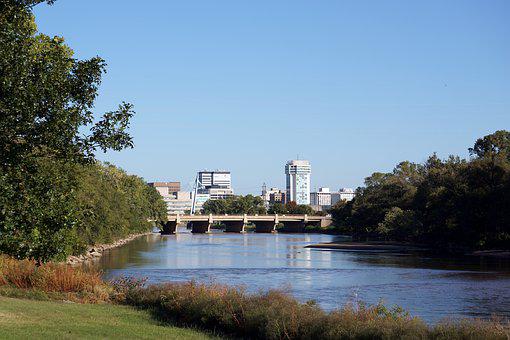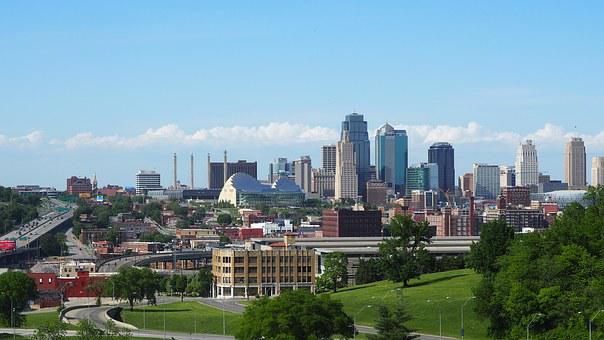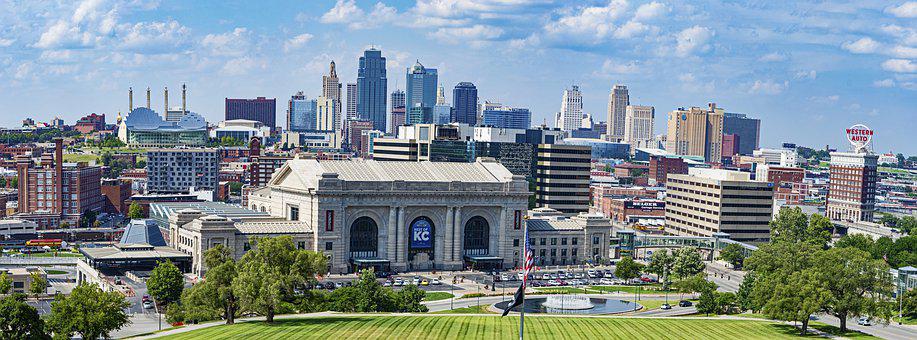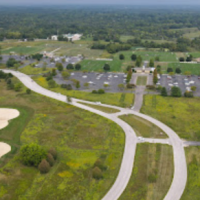If relatively quiet, unhurried days with nice views are your cup of tea, you might like Kansas a lot.
Kansas is a farming country and there are vast wide-open spaces.
There are some cities too, but there’s a lot of empty real estate between them.
Kansas has an interesting history that can keep you busy for a long time, and you may have a lot of time if you live there.

Contents
- Pros of Living in Kansas
- 1. Housing costs are among the lowest in the nation
- 2. The cost of living is also low in Kansas
- 3. Some of the best barbeques anywhere are in Kansas City, where Kansas City-style barbeque was born
- 4. The good food in Kansas does not stop with barbecue
- 5. Traffic is light and commute times are low
- 6. There is a lot of history to explore in Kansas
- 7. There are four distinct seasons in Kansas, and the weather is normally good
- 8. You might think miles and miles of amber waves of grain would be boring, but there is a lot to do in Kansas
- Cons of Living in Kansas
- 1. Rural life is not for everyone, and some may not like it
- 2. You have to have a car to get around.
- 3. Tornadoes are dangerous and there have been more of them in recent years in Kansas
- 4. Weather can be harsh in Kansas
- 5. Taxes are surprisingly high in Kansas
- 6. Small towns are drying up
- 7. Wild animals can be a problem, and rattlesnakes, in particular, can be an issue
- 8. Kansas has a reputation for having a dull, flat landscape
- Pros and Cons of Living in Kansas – Summary Table
- Kansas Safety Overview
- Frequently Asked Questions
Pros of Living in Kansas
1. Housing costs are among the lowest in the nation
The median house price of $150,000 is in the lowest 10.
In rural areas, houses can be found a lot cheaper than that.
In a rural town like Coffeyville, or Dodge City, you can find a nice house for $75,000.
There are two large cities, Kansas City and Wichita, where houses are a little more expensive, but even there they are very affordable.
2. The cost of living is also low in Kansas
It starts with housing, and it continues in many other areas.
A lot of manufactured goods, as well as food, are produced in the state, which makes them cost less.
According to government statistics measuring several aspects of living, Kansas had the third-lowest cost of living in the nation.
Costs of living are 20-40 percent lower than the national average.
The median income for a family is $55,000, and they do well.
3. Some of the best barbeques anywhere are in Kansas City, where Kansas City-style barbeque was born
It is smoked for a long time and has a unique sauce giving it a style all its own.
There are several other styles of barbeque, and you can find those all over the state.
It is very common to see a small barbeque stand that is open a few days a week.
There are also a lot of cattle grown in the state which also has an impact.
4. The good food in Kansas does not stop with barbecue
Kansas has a lot of Hispanic people, many of whom came to work on the railroads in the late 1800s and stayed.
There are lots of great Mexican restaurants as a result.
A lot of the pioneers were Germans, Dutch, and Norwegian.
Those influences can be seen today in the food served around the state.
A large Amish community also has restaurants around the state that produce outstanding food.
5. Traffic is light and commute times are low
In rural areas, there may be 50 miles between towns, and very few cars on the road.
Even Kansas City and Wichita have shorter commuting times than larger cities like Chicago or New York.
The state has the fifth shortest commute time in the nation.
In small towns, the rush hour is more like the rush of five minutes.
Some areas in the western part of the state are very remote and there is very little traffic.
Even daily commutes are relaxing in Kansas.
6. There is a lot of history to explore in Kansas
The state is where much of the Old West was located. Dodge City, with its Boot Hill, is in the southern part of the state.
Kansas was where the cattle drives happened most.
Several battles were fought, and there are a lot of markers for events leading up to the Civil War to make Kansas a free state.
Kansas was also home to the Brown v. Board of Education Supreme Court decision that ended school segregation.
There is also a rich history of Native American cultures to explore as well.
7. There are four distinct seasons in Kansas, and the weather is normally good
Summers can be hot and winters can be cold, but still livable.
Springtime can bring a lot of rain and storms, but it is a time of warm temperatures.
The fall may be the best season.
From late August into late November there is little chance of rain and most days are in the 70s.
The state does not get a lot of rain and there are times of drought, but in general, the four seasons are enjoyable.
8. You might think miles and miles of amber waves of grain would be boring, but there is a lot to do in Kansas
Wichita has 30 museums, a world-class zoo, and there are wildlife parks around the state.
Kansas City has the Negro Baseball League Hall of Fame, as well as modern-day professional football and baseball.
A lot of smaller towns also have interesting museums.
President Eisenhower’s library and boyhood home are in Abilene, also where the first cattle drives ended.
Topeka has the state capital and the Evel Knievel Museum.
Cons of Living in Kansas
1. Rural life is not for everyone, and some may not like it
Especially in the western part of the state, there are very few small towns and most of the land is wheat.
It can be 100 miles between gas stations, and it may not be open.
Further east there are a lot more towns, but there are still a lot of open areas.
It can still take a couple of hours to drive to another city, even with interstates.
A person used to a fast-paced life may find it rather boring.
2. You have to have a car to get around.
There are a few buses in Wichita and Kansas City, but there is nothing outside of that.
To get anywhere, you must have a car.
There is very little traffic congestion though, so that is a positive.
You may not be sitting in traffic waiting for a jam to clear, but you may be sitting for an hour or more driving to the next town.
Kansas has one of the most extensive highway systems in the nation, and they need it for people to go places.
3. Tornadoes are dangerous and there have been more of them in recent years in Kansas
There are tornadoes in the spring. Remember Dorothy and the Land of Oz?
There is a pretty good warning system in place, so if you hear a siren, take shelter because a tornado can be deadly.
Any time there is a thunderstorm, a tornado can emerge, so it is a good idea to pay close attention to the weather in the spring.
4. Weather can be harsh in Kansas
Winters are usually not too bad, but there can be huge snowstorms at times.
Summers can also be very hot.
In Kansas, it is more likely for there to be short hot spells that are very hot and short cold spells that are very cold.
The extremes come, but they usually pass fairly quickly as well.
The northern part of the state gets more snow than the southern areas.
5. Taxes are surprisingly high in Kansas
Wallet Hub ranked Kansas as the state with the 14th biggest tax burden.
The state allows counties, school boards, and cities to finance themselves with property taxes and sales taxes.
As a result, sales taxes can be close to 10 percent, and they are different in various parts of the state.
The income tax is relatively low but is still there.
Property taxes vary a lot by area and are levied by local governments.
Another tax problem to watch out for is, that if you buy a car out of state, you still have to pay Kansas sales tax.
6. Small towns are drying up
With advances in farming, fewer workers are needed, and there are not a lot of jobs in small towns as a result.
Those towns are shrinking every year, and some have faded into becoming ghost towns.
There is not much left in some of these towns, and no reason to go there.
They are places where you could start a business, or find a cheap house, but you might not find much of anything else.
7. Wild animals can be a problem, and rattlesnakes, in particular, can be an issue
There are some towns in the western part that have so many they have roundups, or festivals, honoring the rattling snake.
Bites are rarely fatal, but they are very painful.
They hang out in rocks, and sometimes in fields, so you had better watch your step if you are off the pavement in Kansas.
Deer, wild pigs, rabbits, and such are more nuisances than real problems, but there are a lot of them too.
8. Kansas has a reputation for having a dull, flat landscape
Many people get their idea of Kansas from driving across the state on Interstate 70, and they are not that far off really.
There are some areas, like the Flint Hills in the east, that offer nice scenery, but there are not many areas like that in the state.
In winter it is especially dull, with everything turning brown.
In the western part of the state, you can literally drive 100 miles in a straight line and see nothing but flat land as far as you can look into the horizon.

Pros and Cons of Living in Kansas – Summary Table
| Pros of Living in Kansas | Cons of Living in Kansas |
|---|---|
| 1.Housing costs are among the lowest in the nation | 1. Rural life is not for everyone, and some may not like it |
| 2. The cost of living is also low in Kansas | 2. You have to have a car to get around. |
| 3. Some of the best barbeques anywhere are in Kansas City, where Kansas City-style barbeque was born | 3. Tornadoes are dangerous and there have been more of them in recent years in Kansas |
| 4. The good food in Kansas does not stop with barbeque | 4. Weather can be harsh in Kansas |
| 5. Traffic is light and commute times are low | 5. Taxes are surprisingly high in Kansas |
| 6. There is a lot of history to explore in Kansas | 6. Small towns are drying up |
| 7. There are four distinct seasons in Kansas, and the weather is normally good | 7. Wild animals can be a problem, and rattlesnakes, in particular, can be an issue |
| 8. You might think miles and miles of amber waves of grain would be boring, but there is a lot to do in Kansas | 8. Kansas has a reputation for having a dull, flat landscape |
Kansas Safety Overview
READ THE FULL REPORT: Kansas Safety Review
Safety Index:
- OVERALL RISK: LOW
- TRANSPORT & TAXIS RISK: MEDIUM
- PICKPOCKETS RISK: LOW
- NATURAL DISASTERS RISK: MEDIUM
- MUGGING RISK: LOW
- TERRORISM RISK: LOW
- SCAMS RISK: LOW
- WOMEN TRAVELERS RISK: LOW
Frequently Asked Questions
Is Kansas the windiest state?
Kansas is very windy, but it comes in second to Nebraska.
The Midwest states are largely flat.
There are no mountains to break up the wind, so it blows hard much of the time.
Why are there all those white windmills?
In recent years, Kansas has turned vast areas into windmill farms to create energy from wind.
Windmills are put up around the state and used to produce electricity.
Why is Kansas called the wheat state?
Kansas is the nation’s leading producer of wheat, and it has been that almost every year since records have been kept.
Winter wheat was grown in the early 1800s by white settlers.
In 2017, 319 million bushels of wheat were grown in Kansas, and the state accounts for 18 percent of all wheat grown in the nation.
What is something surprising about Kansas agriculture?
Kansas has ranked in the top three or four in cattle production for many years.
In 2022, Kansas was virtually tied with Nebraska for second place with 6.5 million cattle.
Texas has the most at almost 13 million.
Where does Kansas rank in population density?
Kansas has 35.4 people per square mile, almost the same as Utah, making it the 10th most sparsely populated state in the nation.
Kansas is the 13th largest state in land area.












I’ve lived in Kansas my whole life in a town of about 13,000 to 15,000 people with farms all around with lots of hunting going on. I don’t know of anybody that has actually been bit by a rattlesnake. I think this article is exaggerating a little when it comes to snakes.
I too was born and raised in Kansas, and I know of 3 people who have been bitten by rattlesnakes and 1 person bit n by a copperhead.. I lived in Tonganoxie, a rural farming community outside of Lawrence Kansas
Thank you all for responding to this as I am considering a move to your state! I lived here as a very small child as my father was in the service and was stationed here but I remember the homes and I remember how I really just loved it all…. I have grown up on the west coast but I am working on my bucket list and I want to live there again…. I appreciate your comments. 🙂
this helped me with science
I’m looking to move there From Cali to Az and now to try out Kansas. Cali too rich, Az too hot and becoming too rich.
As far as jobs….do Kansas city offers any technical jobs like computer engineering, or anything that related to more technical skills (engineering, IT support, manufacture engineering, quality engineering, etc.)??
Wichita is the Air capital of the world, so there are a lot of technical jobs related to the aerospace industry.
I was born in Oklahoma and lived in Washington State most my life in 2020 I moved to Sedan KS with my family. Not a day goes by that Im not grateful for the decision. The biggest difference is definitely the people. Kansas is home to the kindest people I have ever met. The only thing I miss living in a town of around 900 people is being close to a Taco Bell.